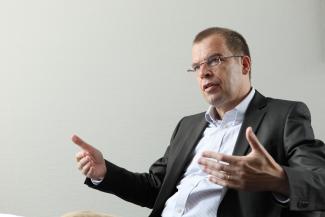
Germany’s drug pricing amnesty reset risks pharma backlash
Print
28 April 2016
Ben Adams / FiercePharma

Germany’s strict drug pricing controls may be about to get a whole lot harsher as the country’s government is mulling over whether to lift a lucrative pricing amnesty.
The current system sees healthcare insurers in the country negotiate discounted prices with pharma companies on their new meds--but the German government has for some time allowed those insurers to pay full price for the latest drugs up to a year from the time they win regulatory approval.
But last week, following consultations with pharma companies, the health ministry said it would draw up new plans in the coming months to limit prices for new drugs and halt this one-year amnesty, according to a report in The Wall Street Journal.
Under this proposal drugmakers could still charge full price for new drugs--but it would mean health insurers would be able to start negotiating discounts once a drug’s sales hit around €250 million ($282 million)--a fairly low limit for blockbuster meds that can easily make two to three times that amount.
As has become a typical pattern for payers across the world, Gilead’s ($GILD) next-gen hep C pill Sovaldi has proven to be the straw that broke the camel’s back, given the $68,000 price tag for a 12-week course the company charged when it first hit the German market two years ago.
Public health authorities pushed back, and eventually won some discounts, but this initial cost put a lot of pressure on the government to further reduce highly priced new meds.
Pharma is not pleased. “This would be a penalty tax for innovation and the completely wrong signal for Germany as a health care location,” Hagen Pfundner, chief executive of the Association of Research-based Pharmaceutical Companies, a lobby group in Berlin, told WSJ.
As the WSJ points out: “For the pharmaceuticals industry, the one-year window allows companies to boost profit on those new drugs before price controls set in. It also helps build early doctor usage in a big, developed-world market. That is often important for the commercial success of new drugs.”
Jason Ward, an analyst at Decision Resources Group, said this decision, if approved, will likely see pharma losing millions rather billions--but it may make some pharma companies less likely to see Germany as a first-launch country.
Germany has become something of a bête noire for pharma, and this latest limitation comes 5 years after the country--the biggest drug market in Europe and the fourth largest in the world--enacted a new AMNOG law that aimed to give the government more control over drug prices and reduce the insurance-based drug bill by billions of euros a year.
The fairly complex AMNOG system works by matching a new drug to a comparator--usually one that it is already on the market--to test whether it is an improvement. If it is, then the government may pay more--but if it isn’t, it will set a lower price.
Those deemed not comparable--or simply inferior in terms of patient-related outcomes--get a non-negotiable rate for their drugs. In this situation, the government will decide what it is willing to pay based on a reference pricing system. A comparator can also be a generic, which would severely drag the price of a new med down.
It will need to pass muster via the IQWiG health technology assessor, akin to what meds go through with England's NICE. Whilst the price set by a company is being assessed, this is when insurers have typically picked up the bill (for around 12 months) for whatever pharma has asked for. But under the new rules, AMNOG would be amended to ensure any drug making more than the €250 million would be see its price capped early.
The AMNOG-IQWiG system has already seen a host of Big Pharma companies complain and even walk away from seeking to sell new drugs on Europe’s largest market, including Novo Nordisk ($NVO) pulling its new diabetes med Tresiba and AstraZeneca ($AZN) and Bristol ($BMY), which together yanked Forxiga in Germany back in 2013, all over these new pricing rules.
But Germany is struggling to pay its healthcare bills. Despite the efforts of the government to curb pricing, total expenditure in Germany’s statutory health sector rose 19.7% to €202 billion ($228.4 billion) in 2015 from 2011--with prescription-drug spending alone jumping 27.1% over the past 5 years.
All Portfolio
MEDIA CENTER
-
The RMI group has completed sertain projects
The RMI Group has exited from the capital of portfolio companies:
Marinus Pharmaceuticals, Inc.,
Syndax Pharmaceuticals, Inc.,
Atea Pharmaceuticals, Inc.

